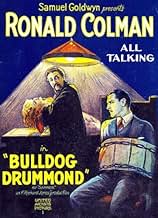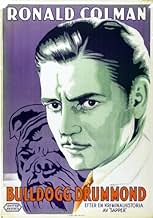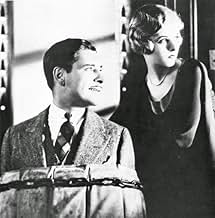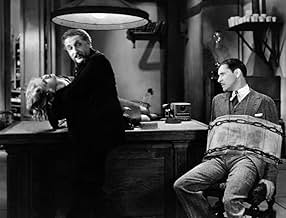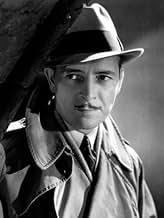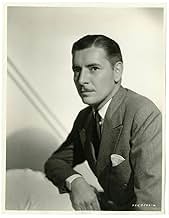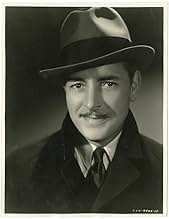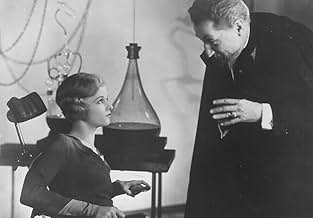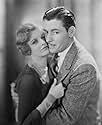AVALIAÇÃO DA IMDb
6,3/10
1,4 mil
SUA AVALIAÇÃO
Adicionar um enredo no seu idiomaA bored WWI veteran helps out a young woman whose uncle is being held hostage by embezzlers.A bored WWI veteran helps out a young woman whose uncle is being held hostage by embezzlers.A bored WWI veteran helps out a young woman whose uncle is being held hostage by embezzlers.
- Direção
- Roteiristas
- Artistas
- Indicado a 2 Oscars
- 5 vitórias e 2 indicações no total
Claud Allister
- Algy
- (as Claude Allister)
Bill Johnson
- Little Boy
- (não creditado)
Tom Ricketts
- Colonel in Club
- (não creditado)
- Direção
- Roteiristas
- Elenco e equipe completos
- Produção, bilheteria e muito mais no IMDbPro
Avaliações em destaque
VERY early talkie from 1929. It stars Ronald Colman as a wealthy WW1 veteran--Hugh "Bulldog" Drummond. He sets out to help people in trouble. He gets a letter from the mysterious Phyllis (Joan Bennett) who believes her father is being held against his will and tortured in a nursing home. She wants Bulldog to rescue him. He agrees and is helped by his faithful valet and annoying best friend Algy (Claud Allister).
Most early talkies are boring stiff affairs but not this one. It moves quickly, is lots of fun, has exciting action sequences and has a great Oscar-nominated performance by Colman. The sound recording is good and the video is as good as can be expected from a 1929 film. The only negative about this is Allister as Algy. He plays his role WAY over the top and comes across as annoying and unfunny. Halfway through I wanted that guy gone! Him aside though this is an enjoyable and fun early talkie.
Most early talkies are boring stiff affairs but not this one. It moves quickly, is lots of fun, has exciting action sequences and has a great Oscar-nominated performance by Colman. The sound recording is good and the video is as good as can be expected from a 1929 film. The only negative about this is Allister as Algy. He plays his role WAY over the top and comes across as annoying and unfunny. Halfway through I wanted that guy gone! Him aside though this is an enjoyable and fun early talkie.
When the first "Bulldog Drummond" stories came out in the 1920s, Great Britain was trying to come to grips with an anomaly: it had been one of the main allied victors in the Great War but the country did not feel like it won anything. It felt it had sacrificed too much.
Britain in 1914 had ruled the waves. It had a small (but apparently competent) standing army. It had a history of democracy that was stable and unmatched by any of the major continental powers of Europe. It had a very highly industrial economy and was commercially quite important on the globe. Finally, it's empire stretched around the world that the boast that "the sun never set on the British Empire" was true - it was also the world's largest empire.
In truth Britain's empire was actually wearing away. Though the British technically won the Boer War Boer Leaders ended up running South Africa. Ireland was getting hotter. The Germans helped stimulate the Easter Rebellion with arms. The British Navy did control the seas but the u-boats almost beat Britain during the war. The naval battles were marred by a total German triumph under Von Spee in the Pacific (Coronel)and the lopsided British ship and men losses at their "victory" at Jutland. Finally, Germany and the U.S. had outstripped British commerce and industrial output by 1914.
With the huge losses of a generation of men, and no tangible gains, Britain was in for a serious period of reactionary feelings and even race baiting. Anti-Semitism (always under the surface) reemerged in the 1920s, mostly due to the rise of Bolshevism in Russia after the 1917 revolutions. The political landscape did not reduce this hysteria. Lloyd George was booted out of the Prime Minister's seat forever in 1922. His successor, Andrew Bonar Law, died after nine months in office. Stanley Baldwin was not fully ready to be Prime Minister in 1923, and would blow his administration by a public hissy fit. His rival, James Ramsay MacDonald, would be the first Labor Prime Minister. But he'd been an outspoken pacifist in the war, and he was suspect of Bolshevistic sympathies (he actually had none). In the 1924 General Election a forged letter (supposedly from Gregory Zinovieff, the head of the Russian Comintern) urged MacDonald's election as an agent of the Russians. Baldwin regained office with a large majority.
It is this background that explains the popularity of "Bulldog Drummond". With governmental drift and doldrums, a declining economy, a feeling of loss of face on the international scene, and a feeling of loss due to immense death toll, the search for easy answers, easy suspects, easy enemies was ready for Sapper's poison. So the public cheered Col. Hugh "Bulldog" Drummond as he created a fascistic group of ex soldiers (like the German Freikorps) to "control" the internal enemy (i.e., Bolsheviks, Jews, Irish). I might add this was not totally made up. Lloyd George gave the go ahead while Prime Minister to create a paramilitary group in Ireland, the "Black and Tans", to combat the Irish revolutionaries. This group was finally decimated by Michael Collins' men on "Bloody Sunday" in 1921.
That Samuel Goldwyn, a Jewish American film producer, produced BULLDOG DRUMMOND, is highly ironic. But it illustrates the care Goldwyn brought to his projects. He had been producing the silent film hits that Ronald Colman appeared in in the late 1920s. Goldwyn wanted Colman to make the transition to sound carefully, and not fall on his face like Colman's rival John Gilbert. Instead of "Darling, I love you!" in HIS GLORIOUS NIGHT, Goldwyn found an exciting adventure part for Colman, which allowed him to display his wonderful, gentleman's speaking voice. As an introduction for a talking Colman, BULLDOG DRUMMOND could not be beaten.
The role had everything to show Colman's versatility. There was his humor, shown at the beginning when he is dismayed at the ridiculously boring men's club he belongs to (full of old fogies). There was his romantic side, with the youthful Joan Bennett. There is his confrontations with the sinister Lawrence Grant (Dr. Lakington) and Grant's two assistants Montague Love and Lilyan Tashman (Carl Peterson and Irma), and his handling of his impossibly stupid friend Algy (Claude Allister). As a "coming out" role for talkies, BULLDOG DRUMMOND did the trick, winning Colman the audience he feared talking films would cost him.
In terms of plot it creaks, with incredible coincidences and twists that allow plot points to fall apart for the creation of new plot points. Still the cast is game, and the script surprises us. Lakington, briefly having Drummond tied up, is speaking to him pretty closely. Colman turns his face from Grant, who accuses him of being more cowardly than he'd admit. Colman rejects this excuse. Then why turn your face away, demands Grant. "Haven't your best friends told you?", says Colman, leaving Grant turning crimson at the thought of halitosis. A later bit of business, allowing Love and Tashman to escape is also unexpected. Yes, it is an antique, but it is a charming one. And as it has none of Sapper's racist crap in it, it is highly recommended.
Britain in 1914 had ruled the waves. It had a small (but apparently competent) standing army. It had a history of democracy that was stable and unmatched by any of the major continental powers of Europe. It had a very highly industrial economy and was commercially quite important on the globe. Finally, it's empire stretched around the world that the boast that "the sun never set on the British Empire" was true - it was also the world's largest empire.
In truth Britain's empire was actually wearing away. Though the British technically won the Boer War Boer Leaders ended up running South Africa. Ireland was getting hotter. The Germans helped stimulate the Easter Rebellion with arms. The British Navy did control the seas but the u-boats almost beat Britain during the war. The naval battles were marred by a total German triumph under Von Spee in the Pacific (Coronel)and the lopsided British ship and men losses at their "victory" at Jutland. Finally, Germany and the U.S. had outstripped British commerce and industrial output by 1914.
With the huge losses of a generation of men, and no tangible gains, Britain was in for a serious period of reactionary feelings and even race baiting. Anti-Semitism (always under the surface) reemerged in the 1920s, mostly due to the rise of Bolshevism in Russia after the 1917 revolutions. The political landscape did not reduce this hysteria. Lloyd George was booted out of the Prime Minister's seat forever in 1922. His successor, Andrew Bonar Law, died after nine months in office. Stanley Baldwin was not fully ready to be Prime Minister in 1923, and would blow his administration by a public hissy fit. His rival, James Ramsay MacDonald, would be the first Labor Prime Minister. But he'd been an outspoken pacifist in the war, and he was suspect of Bolshevistic sympathies (he actually had none). In the 1924 General Election a forged letter (supposedly from Gregory Zinovieff, the head of the Russian Comintern) urged MacDonald's election as an agent of the Russians. Baldwin regained office with a large majority.
It is this background that explains the popularity of "Bulldog Drummond". With governmental drift and doldrums, a declining economy, a feeling of loss of face on the international scene, and a feeling of loss due to immense death toll, the search for easy answers, easy suspects, easy enemies was ready for Sapper's poison. So the public cheered Col. Hugh "Bulldog" Drummond as he created a fascistic group of ex soldiers (like the German Freikorps) to "control" the internal enemy (i.e., Bolsheviks, Jews, Irish). I might add this was not totally made up. Lloyd George gave the go ahead while Prime Minister to create a paramilitary group in Ireland, the "Black and Tans", to combat the Irish revolutionaries. This group was finally decimated by Michael Collins' men on "Bloody Sunday" in 1921.
That Samuel Goldwyn, a Jewish American film producer, produced BULLDOG DRUMMOND, is highly ironic. But it illustrates the care Goldwyn brought to his projects. He had been producing the silent film hits that Ronald Colman appeared in in the late 1920s. Goldwyn wanted Colman to make the transition to sound carefully, and not fall on his face like Colman's rival John Gilbert. Instead of "Darling, I love you!" in HIS GLORIOUS NIGHT, Goldwyn found an exciting adventure part for Colman, which allowed him to display his wonderful, gentleman's speaking voice. As an introduction for a talking Colman, BULLDOG DRUMMOND could not be beaten.
The role had everything to show Colman's versatility. There was his humor, shown at the beginning when he is dismayed at the ridiculously boring men's club he belongs to (full of old fogies). There was his romantic side, with the youthful Joan Bennett. There is his confrontations with the sinister Lawrence Grant (Dr. Lakington) and Grant's two assistants Montague Love and Lilyan Tashman (Carl Peterson and Irma), and his handling of his impossibly stupid friend Algy (Claude Allister). As a "coming out" role for talkies, BULLDOG DRUMMOND did the trick, winning Colman the audience he feared talking films would cost him.
In terms of plot it creaks, with incredible coincidences and twists that allow plot points to fall apart for the creation of new plot points. Still the cast is game, and the script surprises us. Lakington, briefly having Drummond tied up, is speaking to him pretty closely. Colman turns his face from Grant, who accuses him of being more cowardly than he'd admit. Colman rejects this excuse. Then why turn your face away, demands Grant. "Haven't your best friends told you?", says Colman, leaving Grant turning crimson at the thought of halitosis. A later bit of business, allowing Love and Tashman to escape is also unexpected. Yes, it is an antique, but it is a charming one. And as it has none of Sapper's racist crap in it, it is highly recommended.
This was the second film of this title, the third Bulldog Drummond film to be made, and the first with sound (this being the first year of sound films). The original 'Bulldog Drummond' was a 1922 silent, which appears to be lost, starring Carlyle Blackwell. In 1925, 'Bulldog Drummond's Third Round' appeared, starring Jack Buchanan. A print survives, and has been shown at at least one film festival, but few have had the good fortune to see it. This is the classic Drummond film in a series which was to extend to 25 films, if one counts the 1983 satire 'Bullshot'. Ronald Colman is spectacular in the lead, perfect in every way for the part, wryly humorous, dashing, ardent, impetuous but thoughtful: in short, he was the very essence of Captain Hugh Drummond. The film opens with a famous scene, an amusing long tracking shot of the interior of the 'Senior Conservative Club' (fictitious, but modelled on the Carlton Club in St. James) in London, with old gents reading or nodding off in their leather armchairs. The first two times I saw this film, I thought it was meant to be Drummond's own club. But now I am inclined to believe that it is the club of his friend Algy, whose guest he is on this occasion. Drummond says to Algy that he is bored to tears: 'I'm too rich to work, but too intelligent to play'. Algy suggests that he place an ad in The Times seeking adventure, so he drafts one on the spot stating that he finds 'peace too tedious' and invites offers of danger and adventure. The Drummond books by 'Sapper' are based on a former Army captain from the late War, who gets together a band of former soldiers who had served under him in the trenches, in order to pursue adventure in peacetime. It played to the air of total disillusion which followed the First War, similar to that which engendered film noir after the Second War. The post-War motivation is essentially absent from this film, as it was ten years on and no longer fashionable to be moaning about it. This was the first and last sound film directed by the silent director F. Richard Jones, who died of TB the next year aged only 33. The villainess of this film is played chillingly by Lilyan Tashman (astonishingly aged only 20, though playing 40), but she died aged 34 in 1934. Claud Allister is an effete Algy with a monocle, his voice shrill enough to break a wine glass. He has a wonderful moment where he is awakened by a bird popping out of a cuckoo clock, and says: 'Is it really 2 o'clock? How I do detest bird life!' Lawrence Grant is wonderfully sinister as a mad scientist with a fake asylum. The film is stagey, old-fashioned, creaks at the joints, implausible, and Joan Bennett as the girl is so pathetically helpless and whimpering that one wants to scream with frustration. She only becomes the Joan Bennet we were later to know in the love scenes at the inn towards the end, where her voice suddenly deepens and she gets that Joan Bennett glint in her eyes, and the shrinking violet begins to turn into a prowling feline. Despite any flaws, this film is a true classic, conveying as it does so much period atmosphere and the overwhelming charm of Ronald Colman, who made most films he was in into absolute 'must-sees'. If you like Colman or you like Drummond, you have to see this.
So far, all the Ronald Coleman movies I've seen have been
silents. Therefore, I was glad to get a hold on his talkie debut,
Bulldog Drummond. As a film, it is very good. It's pretty exciting,
full of good acting from Coleman, Lilyan Tashman, Claud Allister,
Montague Love and a few others. I found Joan Bennet's work to be
pretty poor and forced. Not quite the same as that role in Woman
in the Window. Still, not bad for a first sound picture.
Since it's an early talkie, the slow-moving moments are excusable.
And there are really very few if you think about it. Plus the dialogue
was hillarious. Props to whoever came up with the role of Algy.
Deffinatly my favorite character. It's not a film everybody will enjoy,
but if you so desire it, this is a better example of a 1929 talkie.
7/10.
silents. Therefore, I was glad to get a hold on his talkie debut,
Bulldog Drummond. As a film, it is very good. It's pretty exciting,
full of good acting from Coleman, Lilyan Tashman, Claud Allister,
Montague Love and a few others. I found Joan Bennet's work to be
pretty poor and forced. Not quite the same as that role in Woman
in the Window. Still, not bad for a first sound picture.
Since it's an early talkie, the slow-moving moments are excusable.
And there are really very few if you think about it. Plus the dialogue
was hillarious. Props to whoever came up with the role of Algy.
Deffinatly my favorite character. It's not a film everybody will enjoy,
but if you so desire it, this is a better example of a 1929 talkie.
7/10.
Melodramatic, overacted, and occasionally senseless, but who cares? Colman is almost devestatingly charming in his first talkie, Bennett is lovely (but a bit whiny at first), and Algy is a first class twit. The villains are vile, the action is fast once you adjust, and Colman is a sheer delight to watch. Why there hasn't been a major Colman revival is beyond comprehension.
Você sabia?
- CuriosidadesThe first (and only) sound film for former Mack Sennett director F. Richard Jones. His command of sound and action with this film was very well received, and he looked set for a bright future. Sadly, Jones succumbed to the tuberculosis epidemic that was running rampant at the time. He was only 37.
- Erros de gravaçãoThe players in the opening credits are set out in the form of a theatre programme. However, notwithstanding the film takes place in England, the spelling on the programme is the American 'program'. However, while the film is portrayed as taking place in England, it was produced in the U.S.; thus, the Americanized spelling of "program" in the credits is not inconsistent.
- Citações
Hugh 'Bulldog' Drummond: Danny, pack my bag. Pyjamas, toothbrush and a gun.
Danny: Please sir. Don't you really think sir? Yes sir.
Hugh 'Bulldog' Drummond: On second thought, never mind the pyjamas. Just the toothbrush and the gun.
- Cenas durante ou pós-créditosThe cast listing resembles a play program with six listed names/roles on each of two pages. Both pages have "Program Continued" at the top of the list and "Program Continued On Following Page" at the bottom.
- Versões alternativasWhen first released in France, the film was presented in a talkie version in English with French subtitles and in a silent version.
- ConexõesFollowed by Temple Tower (1930)
Principais escolhas
Faça login para avaliar e ver a lista de recomendações personalizadas
- How long is Bulldog Drummond?Fornecido pela Alexa
Detalhes
- Data de lançamento
- País de origem
- Idioma
- Também conhecido como
- Bulldog Drummond
- Locações de filme
- South Bank, Lambeth, Londres, Inglaterra, Reino Unido(opening scene)
- Empresa de produção
- Consulte mais créditos da empresa na IMDbPro
Bilheteria
- Orçamento
- US$ 550.000 (estimativa)
- Tempo de duração1 hora 30 minutos
- Cor
- Mixagem de som
- Proporção
- 1.20 : 1
Contribua para esta página
Sugerir uma alteração ou adicionar conteúdo ausente

Principal brecha
By what name was Amante de Emoções (1929) officially released in India in English?
Responda
